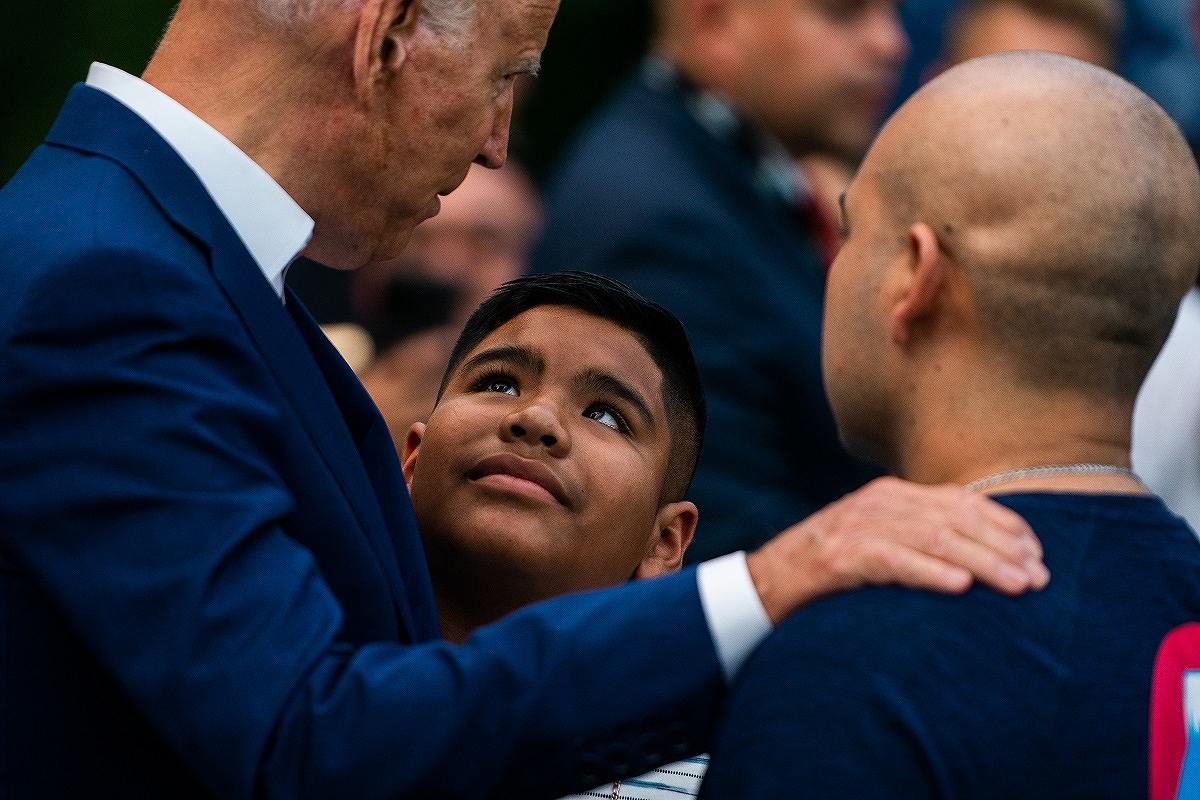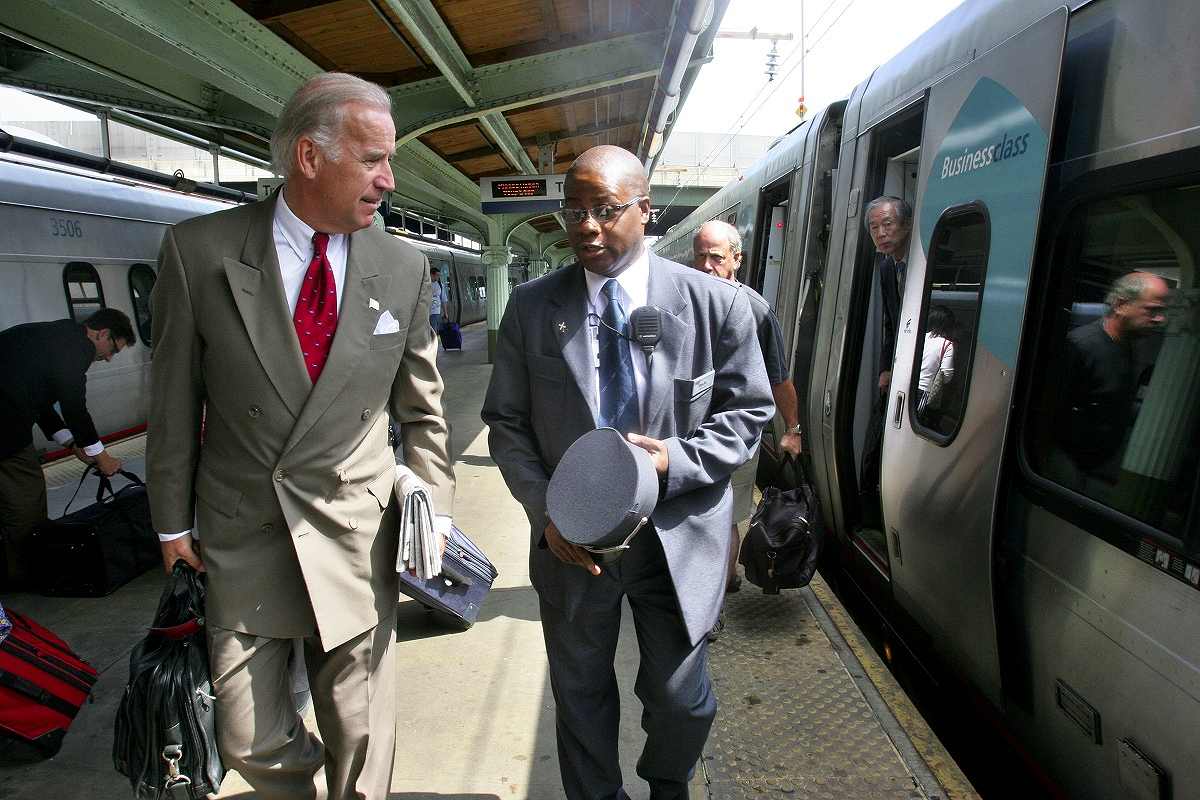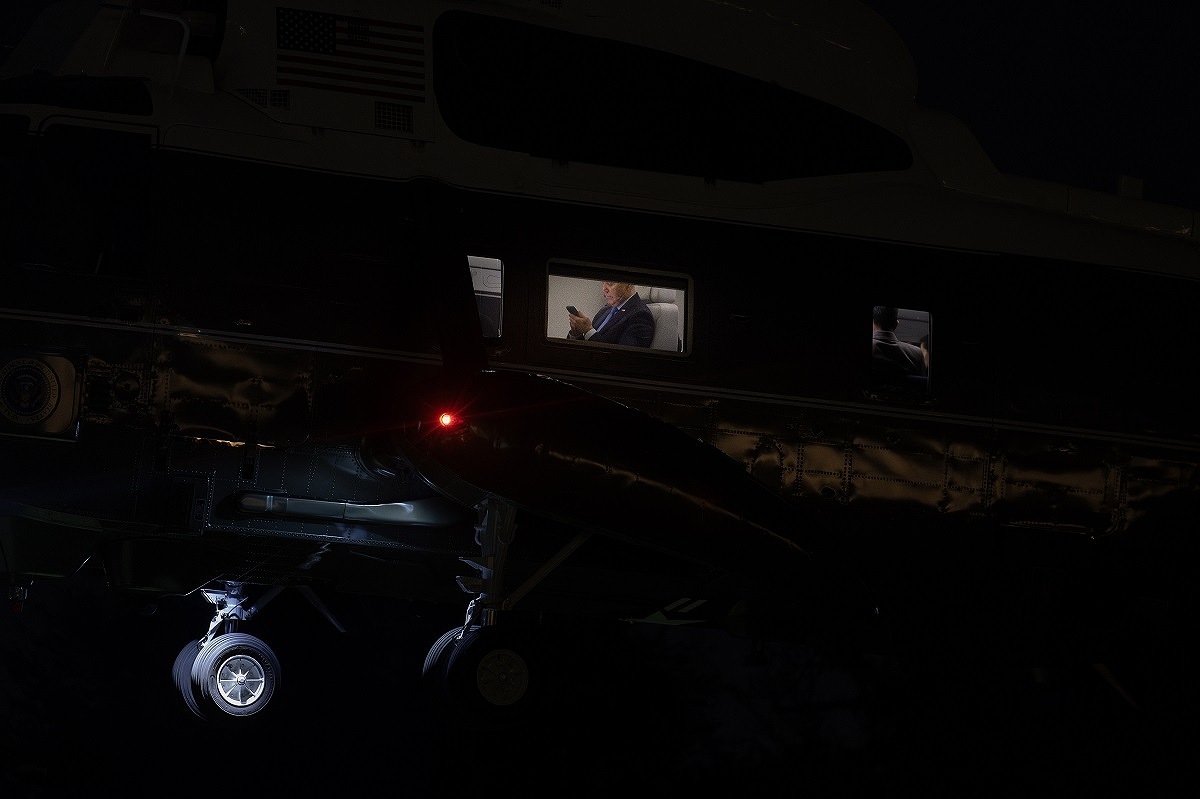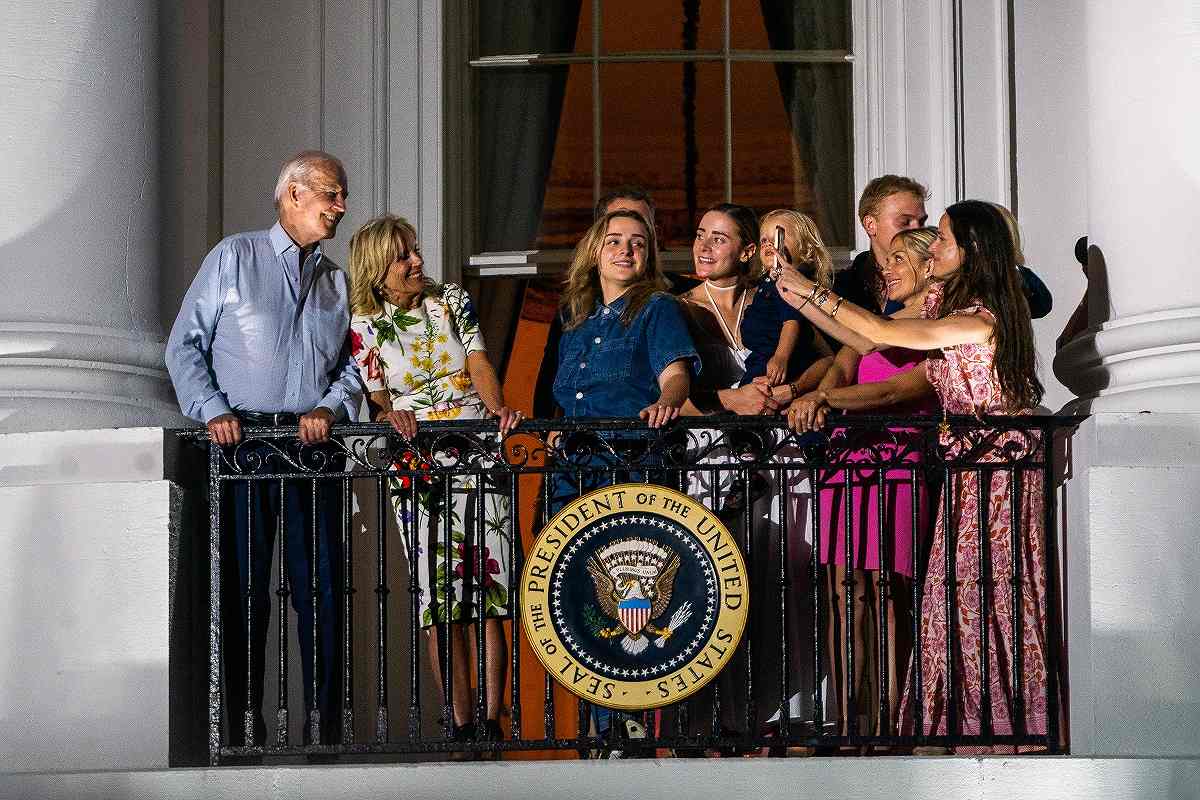
President Biden greets visitors during a Fourth of July barbecue at the White House in 2021.
17:07 JST, March 2, 2024
In the early months of his presidency, as the pandemic dragged on with its stifling restrictions, President Biden often delivered a favorite monologue to aides: He was worried about young people’s mental health, he said. High school seniors were missing prom and graduation. He wanted to know how college students went on dates.
Specifically, Biden wondered how young people could “make love” under the circumstances, according to two aides who heard the president use that phrase multiple times during his first year in office. Biden’s fixation on loneliness among young people, the aides said, grew out of his near-daily conversations with his grandchildren.
Biden brought those concerns to Surgeon General Vivek H. Murthy, who had written a book on loneliness, and encouraged him to prioritize the issue. Last May, Murthy released a National Strategy to Advance Social Connection, accompanied by guidance “calling attention to the public health crisis of loneliness, isolation, and lack of connection in our country.”
As president of the United States, Biden has access to practically unlimited information. He receives a daily classified briefing from the world’s most powerful intelligence apparatus. He can mobilize the vast machinery of the U.S. government to deliver data on various topics. He can convene meetings with world leaders, Cabinet officials or experts in any field – and often does.
But to a remarkable degree, Biden relies on direct personal interaction for information: catch-up chats with his children and grandchildren; talks with fellow parishioners after Mass; exchanges with workers on his property in Wilmington, Del; spontaneous calls to former colleagues. From consumer prices to masking guidelines to loneliness, the president brings their worries to the Oval Office.
The informal channels allow Biden to get authentic information and break out of the presidential bubble. But the chance encounters and informal chats also give the information a random, limited quality, seeming to depend on whom Biden runs into and their concerns of the moment, leaving some aides to marvel at the influence these casual interactions have on setting the governing agenda.
“There’s nobody that has been president of the United States in the last 50 years that spends as much time doing that and enjoying doing that and gaining information by doing that,” said former senator Ted Kaufman (D-Del.), a close friend and longtime staffer. “If you know what Joe Biden is about, that’s what Joe Biden is. You couldn’t change him.”
Now in his fourth year in office, Biden has compiled an extensive record as chief executive of the most powerful organization in the world. Voters’ judgment on how he has filled that role will be critical as they decide whether they grant him a second term. The Washington Post is examining three pillars of Biden’s leadership – how he absorbs information, how he makes decisions and how he talks to Americans – based on interviews with more than 100 current and former White House staffers, political allies and adversaries, and close friends of the president.
The result is a rare portrait of a very private president based on details and incidents that have not been previously reported. The White House declined to make Biden available for an interview.
– – –
The Monday barrage

Biden, then senator, speaks with an Amtrak conductor while leaving the train from Wilmington during his commute in 2005.
Biden’s aides concede privately that Americans’ perception of him as a declining octogenarian is now his biggest political hurdle. That comes partly from his physical appearance: At 81, he walks stiffly, speaks haltingly, squints awkwardly. The concerns were underlined by special counsel Robert Hur’s recent report that his decision not to prosecute Biden for mishandling classified documents was partly due to the president coming off as “a sympathetic, well-meaning, elderly man with a poor memory.”
Aides and allies of the president insist that description bears no resemblance to the man they know, saying their jobs would be much easier if it did. In private, they say, Biden swears. He raises his voice. He demands more information. He dresses down aides, on occasion threatening to fire them, though he never does.
Staffers have learned to brace for a particularly fierce barrage from the president on Mondays after he returns from his regular weekend trips to Delaware, as he demands answers to questions from residents of Wilmington or Rehoboth Beach with whom he has chatted.
One week, Biden told aides that a gardener on his property in Wilmington was complaining about rising prices. Biden knew inflation was a problem, but now he directed his team to find better ways to tell Americans how he was fighting it.
On another Monday, Biden walked into the Oval Office with detailed questions about the renewable-fuel standard, a little-known rule designed to limit greenhouse gas emissions. In Wilmington over the weekend, he had heard from a resident worried that the rule could lead to job losses at a nearby refinery.
After attending Mass one weekend in Delaware, the president told his aides that congregants were confused about the government’s covid-19 masking policy. He told his team to clarify the guidelines on when people were still required to wear face coverings.
All presidents look for ways to gather information from outside the golden cocoon of the White House. Barack Obama read 10 letters a night from ordinary Americans, studying them in the solitude of the White House residence. Donald Trump made late-night calls to his well-connected, often wealthy friends, soliciting advice and sharing grievances.
Decades ago, the presidency was far less insular. President Franklin D. Roosevelt, on his trips to Warm Springs, Ga., would pull into farmers’ driveways to ask about their crops, presidential historian Douglas Brinkley said.
Biden is in many ways extending the habits of his 36 years as a senator, when he rode Amtrak to and from Wilmington each workday, chatting with conductors, listening to passengers and getting real-time feedback. While his bubble has shrunk dramatically, informal communication still influences his priorities; the encounters may be fewer, but that means each one carries greater weight.
Biden loves to make unannounced calls to current and former lawmakers, to seek advice or just check in. But the outreach is largely one-way; longtime friends have been surprised at how difficult it is to get to the president these days. One old friend said that one of the rare times he heard from Biden was by accident, when the president inadvertently dialed him while playing with his dog in his yard in Wilmington.
Biden does speak regularly to Obama and former president Bill Clinton. Aides say Biden is more regularly in contact with Clinton – whose outgoing style he shares – even though he spent eight years as Obama’s vice president.
For all his gregariousness, though, Biden has always kept an unusually tight circle of advisers, several of whom are now in the White House with him. Many top aides have worked for Biden for decades and become personally close with the president and his family. Kaufman, now his best friend, was initially Biden’s chief of staff in the Senate. Another close confidant, Mark Gitenstein, worked for Biden in the 1980s on the Senate Judiciary Committee and is now ambassador to the European Union.
Biden has remarked on how restricted his life has become, saying at a town hall in 2021 that the White House is a “little like a gilded cage in terms of being able to walk outside and do things.” That has led him to leave the confines of 1600 Pennsylvania Avenue nearly every weekend, mostly to spend time at his homes in Delaware or visit the presidential retreat at Camp David.
A classic retail politician, Biden has long relished a rope line or a parade. As a presidential candidate, he was notoriously late to campaign appearances because he had stuck around at an earlier event to talk with voters for much longer than his aides planned – or wanted. The pandemic put an abrupt end to that near the end of the 2020 primaries, and now that he has resumed chatting with ordinary people, he is surrounded by a phalanx of Secret Service agents who limit his interactions.
– – –
Biden’s bookshelf

Biden aboard Marine One in January.
Unlike other presidents, Biden is not an avid reader of books, consumer of pop culture or follower of professional sports. Aides and friends say he is likely to hear about sports scores from his wife, an enthusiastic fan of Philadelphia’s teams, rather than by watching a game himself. That makes personal conversation one of his only unofficial sources of information.
“Biden is not a recreational reader,” said Ron Klain, Biden’s former chief of staff. “He’s a voracious reader of briefings.”
In the evenings, if Biden is not talking to his children or grandchildren, he is usually diving into a report prepared by his aides.
On a typical day, Biden leaves the Oval Office at dinnertime to eat with his wife. He then spends about two hours poring over his daily briefing book, which often runs more than 100 pages and can include as many as 300, Klain said.
His news consumption comes from three main sources: cable television, print newspapers and the Apple News app on his iPhone. Biden is a loyal watcher of “Morning Joe” on MSNBC, tuning in most mornings while he works out. If the show runs a negative segment on Biden, he often complains to aides in the morning when he arrives at the Oval Office.
Biden also watches CNN and Fox News, aides say. Although he is not nearly as glued to the television screen as Trump was, some aides wish the president would spend less time watching cable news.
A stack of print newspapers awaits Biden outside the Oval Office each day, and he often thumbs through them in the outer lobby or reads them aboard Air Force One – or the Marine One helicopter, where it’s too loud to talk. One aide said his favorite newspaper is the Financial Times, a British-based business daily.
Biden regularly calls a top aide when a story catches his attention. Late last year, Biden phoned Jeff Zients, his chief of staff, after reading about a letter that Democratic lawmakers had written to Education Secretary Miguel Cardona urging the administration to expand its student debt relief plan.
Biden pressed Zients, wanting to make sure his team was making the relief as expansive as possible. White House officials say they are still formulating the policy, adding that their goal is indeed to make relief accessible to large numbers of people.
Just before the 2022 midterm elections, Biden read a news story about a spike in online chatter about “civil war.” The president had just spoken in Philadelphia to warn that Trump and his supporters threatened “the very foundations of our republic,” and after reading the story, he decided he wanted to give another sweeping speech.
He called Mike Donilon, one of his closest aides, saying he wanted to address the embrace of violence in the country. So six days before Election Day, Biden went to Washington’s Union Station and spoke about democracy again, this time with a focus on the rise of political violence.
Biden seems rarely to read for pleasure. Clinton was known to walk around the West Wing holding a book, often a work of fiction. He came up with the idea for a national stockpile of critical medical supplies after reading “The Cobra Event,” by Richard Preston, about a fictional bioterrorism attack. Obama as president posted lists of his favorite books, including a summer reading list timed to his annual vacation to Martha’s Vineyard in Massachusetts. Trump, while not a big reader, commented regularly on events in pop culture. Biden, in contrast, rarely discusses what he is reading or pop culture.
When he does read for leisure, he appears to focus almost exclusively on policy and history. According to Biden’s aides, some of the books he’s read recently include “Ten Lessons for a Post-Pandemic World,” by Fareed Zakaria, and “Why England Slept,” the published version of President John F. Kennedy’s senior thesis from Harvard.
Before the 2022 midterms, Biden was spotted carrying a copy of “And There Was Light: Abraham Lincoln and the American Struggle,” by Jon Meacham, who advises the president on speechwriting. And while shopping in Nantucket, Mass., where he was celebrating Thanksgiving last year with his family, Biden emerged from a bookstore holding “Democracy Awakening: Notes on the State of America,” by Heather Cox Richardson, a historian who met with Biden at the White House in 2022.
– – –
Sharing wacky stories

The Biden family watches fireworks during the Fourth of July celebration at the White House in 2022.
Much of his leisure time, though, is spent with family, either in person or on the phone. Aides say the president rarely goes a day without talking to his two surviving children, Hunter and Ashley, as well as his five grandchildren, who are in their teens or older.
This younger generation has become an important source of information for the 81-year-old president. As vice president, Biden made headlines – and angered Obama aides – by telling a television interviewer that he supported legalizing same-sex marriage at a time when Obama had not yet announced his own support. Aides to Biden say his grandchildren were especially influential in his embrace of that policy, and since then, the grandkids have affected his views on issues such as climate change, which the president has put at the center of his agenda.
Like many presidents, Biden also relies on mail as a way to hear directly from ordinary people. The White House Office of Presidential Correspondence, which dates to President William McKinley more than 120 years ago, oversees the thousands of letters – now mostly emails – the president receives every day.
Each president interacts with that outpouring from the American public in their own way. Clinton received a batch of letters every few weeks, while President George W. Bush received them less frequently. Obama was characteristically systematic, asking his staff to insert 10 letters into his briefing materials each night.
Biden is given five letters a week, often setting them aside for weekend reading. While Obama sought a representative sample of letters, Biden aides have asked staffers in the correspondence office to select letters that skew toward the positive. In particular, officials are asked to select letters from Americans who focus on how Biden’s policies have improved their lives.
But if the letters are carefully chosen, other streams of information are more random. In his regular use of Apple News, the president sometimes comes across wacky trending stories, including articles on unusual animal behavior, which he then eagerly shares with staffers sitting nearby.
That has prompted a joke among aides: They muse about calling Apple CEO Tim Cook and asking him to change Biden’s Apple News algorithm. That way, they say, the president would get a more curated feed – and more predictable information.
Top Articles in News Services
-

Survey Shows False Election Info Perceived as True
-

Hong Kong Ex-Publisher Jimmy Lai’s Sentence Raises International Outcry as China Defends It
-

Japan’s Nikkei Stock Average Touches 58,000 as Yen, Jgbs Rally on Election Fallout (UPDATE 1)
-

Japan’s Nikkei Stock Average Falls as US-Iran Tensions Unsettle Investors (UPDATE 1)
-

Trump Names Former Federal Reserve Governor Warsh as the Next Fed Chair, Replacing Powell
JN ACCESS RANKING
-

Producer Behind Pop Group XG Arrested for Cocaine Possession
-

Japan PM Takaichi’s Cabinet Resigns en Masse
-

Man Infected with Measles Reportedly Dined at Restaurant in Tokyo Station
-

Israeli Ambassador to Japan Speaks about Japan’s Role in the Reconstruction of Gaza
-

Videos Plagiarized, Reposted with False Subtitles Claiming ‘Ryukyu Belongs to China’; Anti-China False Information Also Posted in Japan
























